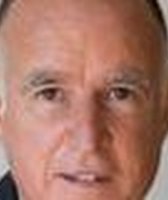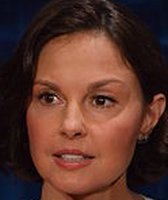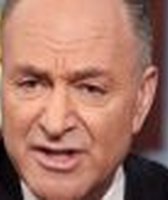Stand up for the facts!
Our only agenda is to publish the truth so you can be an informed participant in democracy.
We need your help.
I would like to contribute
Bernie Sanders is called many things: independent, progressive, socialist, democratic socialist, social democrat, communist, Intrepid, the Vermont Bonecrusher, etc.
But what about just plain, old "Democrat"?
"Bernie is a Democrat ‘some days,’ " California Sen. Barbara Boxer, who supports Hillary Clinton, tweeted glibly on Feb. 3.
Responding to Boxer’s criticism during that night’s town hall in New Hampshire, Sanders said, "Of course I am a Democrat and running for the Democratic nomination."
Despite this certainty, Sanders seems uncommitted to being committed to the party. His Senate website and press materials continue to label him as an "independent" while his campaign website lists him as a "Democratic candidate." In his home state of Vermont, there is no party registration.
So can Sanders accurately claim to be unaffiliated with a political party while still running for the Democratic nomination and sometimes calling himself a Democrat?
It may seem oxymoronic, but yes, he can.
The 40-year outsider
Sanders’ electoral history places him firmly in the independent camp, but also shows that he has been gradually moving away from the far left.
Between 1972 and 1976, Sanders was the nominee of the anti-capitalist, anti-war Liberty Union Party of Vermont in two Senate and two gubernatorial elections in Vermont. He lost all four races and resigned from the party in 1977, calling it "sad and tragic," according to Greg Guma, author of The People's Republic: Vermont and the Sanders Revolution.
In 1981, Sanders made an independent bid for mayor of Burlington as a self-described socialist. He won by 10 votes over the city’s Democratic mayor and two other independents, and went on to win three more terms.
Democrats and leftists disagree on where Sanders’ political allegiances were during this decade.
Liberty Union Party co-founder Peter Diamondstone doesn’t buy Sanders’ claims to independence. He told the Daily Caller that Sanders "became a full-time Democrat" in 1984, when he campaigned for Democratic presidential candidate Walter Mondale.
Yet Sanders continued to fight with the party locally and his "goal was the destroy Democrats," Maurice Mahoney, the head of Burlington’s Democratic Party in the 1980s, told Politico. He also mounted independent challenges against Democrats, including Vermont’s first female Democratic governor in 1984, and reiterated that he had no party affiliation.
"I am not now, nor have I ever been, a liberal Democrat," he said in a 1985 New England Monthly profile, according to Politico.
"Socialist is the political and economic philosophy I hold, not a party I run under," he explained in 1988, when he unsuccessfully ran for Congress.
Partly in the club
Running for Congress as an independent in 1989, Sanders penned an op-ed in the New York Times calling the two parties "tweedle-dee" and "tweedle-dum." After he won a seat in the House of Representatives, he continued to hold the Democratic Party at a rhetorical arm's length even as he moved closer to them.
After calling it "ideologically bankrupt," Sanders lobbied for admission into the Democratic caucus for practical reasons (getting coveted committee assignments, mustering votes for bills), according to news reports from his first year in Congress. But party leaders wouldn’t let him join as he refused to become a Democrat.
So in 1991, Sanders along with four liberal Democrats founded the Congressional Progressive Caucus and he became its chairman. During his second year in office, Sanders continued to agitate and criticize Democrats, lumping them in with Republicans and call both parties’ tax proposals "grossly inadequate."
At some point, Sanders began to win the goodwill of Democratic leadership, all the while refusing to join the party.
A month before he was re-elected to a third term in 1994, House Democrats blessed his claim for a leadership role on one of his committees. Sanders had no Democratic challenger that year, and a spokesperson for his Republican opponent called Sanders "an adjunct to the Democratic Party" according to the Washington Post.
The party backed Sanders’ 1996 re-election bid over one of their own. Burlington lawyer and Democrat Jack Long, after being informed that the party was committed to Sanders, told the Washington Post that he felt like he was "caught in a Kafka play." Sanders wouldn’t have another Democratic opponent until 2004.
By 1997, Sanders was still not a member of the House Democratic Caucus nor a Democrat. But he voted with the party more often than the average Democrat (95 percent of the time opposed to 80 percent). Keeping good to their promise, Democratic leadership gave Sanders a subcommittee chairmanship over a freshman Democrat.
When he ran for the Senate a decade later in 2006, still as an independent, the party worked to stop Democratic candidates from running against him, and he was endorsed by numerous state and national Democrats.
You are what you say you are
In his 2016 presidential bid, Sanders seems to oscillate between labeling himself as a Democrat and being an independent. But that’s neither inaccurate nor particularly unusual, experts said.
Unlike elsewhere in the world, joining the two major parties isn’t contingent upon membership fees or an application process. Party leaders also don’t have the power to say someone isn’t a Democrat or a Republican.
So political affiliation in the United States is a matter of self-identification, in both the governing system and the party organizations, experts said. That allows Sanders and other elected officials to be flexible.
For example, Pennsylvania Sen. Arlen Specter switched from Republican to Democrat in office in 2009, while Connecticut Sen. Joe Lieberman became an "Independent Democrat" after losing the Democratic primary, pointed out Daniel Holt, an assistant historian in the Senate Historical Office.
"There is nothing official to mark their party membership," Holt said.
"So it certainly does happen that candidates switch into and out of independent status, and I suppose they're called by whatever party they're running as at the time," said Marjorie Hershey, a professor of political science at Indiana University who specializes in political parties.
Sanders listed the Democratic Party as his party affiliation in his statement of candidacy. At the start of his campaign, he still seemed uncomfortable self-identifying as a Democrat.
When asked if he would officially join the party on April 30, 2015, when he announced his candidacy, Sanders said, "No, I am an independent who is going to be working with the —" cutting himself off mid-sentence.
In November, Sanders announced that he was full-fledged Democrat and declared as a Democrat in New Hampshire. But, as we previously noted, he’s still calling himself an independent in some cases, so it’s unclear how committed Sanders is to any label. The Sanders campaign did not get back to us.
Experts said it probably doesn't matter to his candidacy.
"The freedom of association part of the First Amendment protects political parties. If they want to nominate a non-member, they can do that," said Richard Winger, an expert on ballot access.
Winger pointed out several instances of a party nominating a non-member: 1872 when the Democratic Party chose Republican Horace Greeley; in 1864 when the Republican Party chose Democrat Andrew Johnson; and in 1952 when the Republican Party picked independent Dwight Eisenhower (who promptly changed his party registration).
Robert Wigton, a political science professor at Eckerd College who wrote The Parties in Court, said he’d call Sanders an independent for now, given how little the senator has said on the topic. But as he gets closer to the nomination, he’ll make the switch and "probably try to shed that ‘socialist label’ if he gets close to a general election ballot."
One thing is clear: Sanders isn’t enthusiastic about being part of the Democratic club, or any club for that matter.
"He was never really a party guy," Guma, the author of the book on Sanders’ legacy in Vermont, told the Daily Beast. "His career was to be a voice and a candidate."
Our Sources
BernieSanders.com, About, accessed Feb. 22, 2016
Sanders.senate.gov, About, accessed Feb. 22, 2016
Sanders.senate.gov, Press releases, accessed Feb. 22, 2016
Nexis search
Politico, "Can Bernie Sanders Win the Love of a Party He Scorns?" Aug. 10, 2015
The Washington Post, "The Burlington Road," March 12, 1989
New York Times, "Socialist Vows to Be Capitol Outsider," Nov. 12, 1990
The Washington Post, "House Democrats Weigh Bid By Sanders to Join Caucus," Nov. 22, 1990
St. Petersburg Times, "Socialist is a man without a caucus," Dec. 2, 1990
USA Today, "Socialist savors deal; Concession to Dems wins seat on panel," Dec. 3, 1990
Boston Globe, "Mr. Sanders Goes to Washington," Dec. 4, 1990
Washington Post, "Vermont's Man From Left Field; Rep. Bernard Sanders, Sticking Out in Congress Like a Sore Socialist," July 9, 1991
Los Angeles Times, "Socialist in Congress goes where Democrats, Republicans fear to tread," Sept. 8, 1991
Los Angeles Times, "Seducing the class of ‘92," Jan. 24, 1993
Washington Post, "Democrats Back Chairmanship For Independent," Nov. 6, 1994
Boston Globe, "The Democrats honor promise to Sanders," Feb. 15, 1997
Federal Election Commission, Bernie Sanders’ statement of candidacy, April 30, 2015
Seven Days, "In Bid for Democratic Nomination, Sanders Remains an Independent," April 30, 2015
ABC, This Week, Nov. 8, 2015
Email interviews with Daniel S. Holt, assistant historian at the U.S. Senate Historical Office, Feb. 22-23, 2016
Email interview with Richard Winger, editor of Ballot Access News, Feb. 22, 2016
Email interview Robert Wigton, professor of political science at Eckerd College, Feb. 23, 2016
Email interview with Candice Nelson, professor of political science at American University, Feb. 22, 2016
Email interview with Marjorie Hershey, professor of political science at Indiana University, Feb. 22, 2016








































